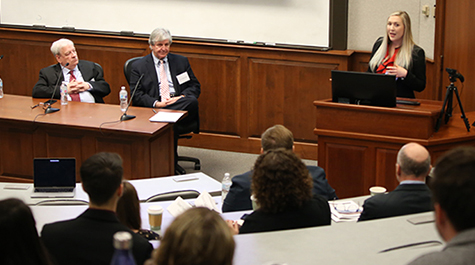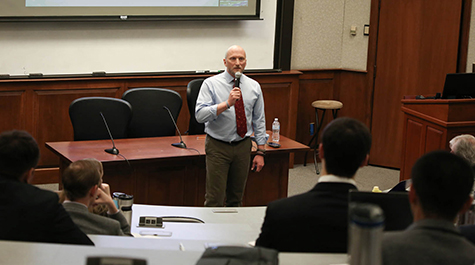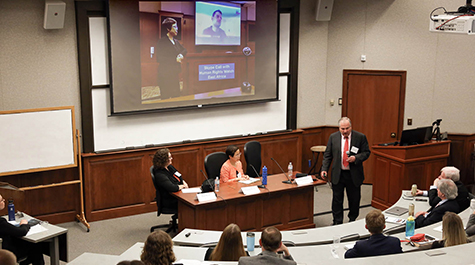ELPR Hosts Symposium on Regulations in the Mining Industry
On March 29, the William & Mary Environmental Law and Policy Review hosted its spring symposium on “The Changing Landscape of Regulations in the Mining Industry,” bringing together scholars of law, policy and public health to discuss their research into environmental effects and regulations of mining operations.
The symposium invited the speakers to explore the topic of mining from a variety of perspectives, including legal regulation, medical science and human rights frameworks.
“I chose this topic because I grew up in southern West Virginia,” said symposium editor Jordan Smith J.D. ’19. “I lived beside a railroad track that ran exclusively coal trains, my father worked in several different mining operations, and I went to a high school that was built on top of a former strip mine, so I’m no stranger to the things that mining can do to our environment, and how it also benefits us. But today I want us to explore these benefits and the drawbacks that we may experience from the industries that we so heavily rely on.”
The first speaker was Professor Erin Ryan from Florida State University College of Law. Ryan, who began her academic career at the College of William & Mary, spoke about environmental federalism and the complicated intersections of federal, state and local mining regulations.
Following Ryan was a panel on the development of mountain top removal mining. Professor Patrick McGinley of West Virginia University College of Law and Caitlyn Greene, an LL.M. candidate from the University of Arkansas School of Law, described legal aspects of mountaintop removal mining, and Michael McCawley, a Clinical Associate Professor from the West Virginia University School of Public Health, discussed the insufficiencies of current EPA public health regulations on the industry.
In the next panel, Professor Michael Livermore of the University of Virginia School of Law and Liz Edmondson, a staff attorney from the Kentucky Resources Council, discussed science-based methodologies in developing environmental law. Professor Jan Laitos from the University of Denver Sturm College of Law joined the panel through a video call to share a new framework for thinking about environmental law.
After a break for lunch, Professor James May from the Widener University Delaware Law School discussed mining in the context of human dignity, while keeping the students in attendance on their toes with cold calls about human rights law. Luke Danielson, the President of the Sustainable Development Strategies Group, spoke about International frameworks for mineral development.
The final panel discussed problems arising with Chinese mining companies in developing nations, with talks by Professor Robert Percival of the University of Maryland Carey School of Law, Professor Zhang Jingjing, Lecturer of Law from the University of Maryland Carey School of Law, and another presentation from Professor Ryan.
The Environmental Law and Policy Review, which hosts its Spring Symposium on a new topic each year, has been in publication since 1975, making it one of the oldest publications at the law school. It is currently ranked second nationally in energy law, and is consistently in the top 10 environmental law publications overall.
About William & Mary Law School
Thomas Jefferson founded William & Mary Law School in 1779 to train leaders for the new nation. Now in its third century, America's oldest law school continues its historic mission of educating citizen lawyers who are prepared both to lead and to serve.


